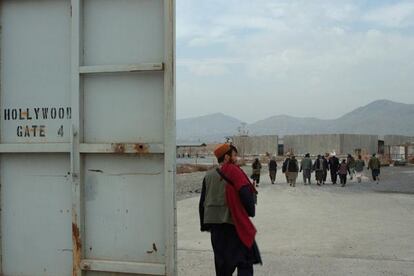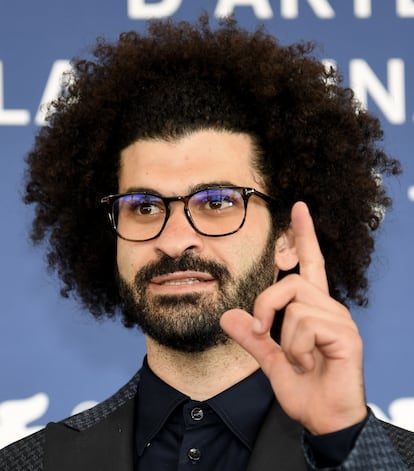Ethical dilemmas, extremism and great personal risk: a documentary filmmaker embedded with the Taliban
The director of ‘Hollywoodgate,’ which is being screened at the Venice Film Festival, reached an agreement with the fundamentalists to film inside the Afghan regime for a year

Just as everyone was leaving, Ibrahim Nash’at arrived. His mission would begin just as the last U.S. soldier left Afghanistan. For this he brought his camera. And, a few days after the Taliban retook Kabul, on August 31, 2021, he turned it on. Alone with his equipment, in the middle of the resurgence of a totalitarian Islamist regime. He planned to film for an entire year, an undertaking that would either reap a bold documentary, or sign his own death warrant. In fact, Nash’at believes his fate once swung towards the latter option. In the end, he achieved the former, thanks to a kind of pact with the fundamentalists: he would not film what they did not want to be filmed. The premiere of Hollywoodgate at the Venice Film Festival offers audiences an exclusively intimate and unprecedented insider’s view of the Taliban. But, at the same time, an ethical dilemma: is a documentary worth a deal with extremists?
“Of course, I was haunted by the futility of the process. If we fail to show who they really are, you can throw what we shot in the trash. But if it works, it can help open the eyes of the world to the daily suffering of Afghans and the trauma caused by past and present warlords,” the Egyptian filmmaker says via email. In reality, the idea was almost doomed to be a failed attempt. Accustomed to filming world leaders as a journalist, Nash’at believes that you only get access through a mediator. And he thought he had succeeded in this case too, until his call stopped being answered, just as he was about to travel to Kabul. He went anyway and searched for other contacts. By the time he had run out of money, however, he still hadn’t filmed anything.
While preparing to shelve the project, before he left the country, his translator encouraged him to go and film at least his cousin, who had been sent by the Taliban to work at an airport near Kabul. It turned out that it was the Hollywood Gate former CIA base, which U.S. military personnel had left behind, along with $7 billion worth of war materiel, when they evacuated. It also transpired that, in order to be filmed, the subject would need authorization from a superior. Nash’at worked his way up the command ladder to Mawlawi Mansour, the new head of the air force, and Lieutenant Mukhtar. He had two protagonists for his movie. He had his approval, on certain conditions. And he had a location. He had found, in short, his documentary.

“I made it clear in my agreement that I would show what they wanted me to see, but also what I saw,” the filmmaker stresses. That is, one of the famous caves where the Taliban hid in the mountains; the repair of planes and helicopters in preparation for a military parade, which would include a battalion of suicide bombers; the discovery of medicines, rifles or walkie talkies at the American base, but also bottles of Jägermeister in the freezer; or admissions from Taliban fighters such as: “My wish is to still have the U.S. troops here, to organize an ambush with a machine gun and 500 bullets and keep shooting until my heart is satisfied. And then to become a martyr.”
In Hollywoodgate, a Taliban fighter is also a human being: he is shown during family moments with his children, throwing a plastic cup out of the car window, or worrying about who stole a cucumber at lunch. But, at the same time, he makes banal miscalculations, shows a thirst for power above his faith, punishes mistakes with slaps on the face, or wonders whether his ruthless mistreatment of women is really justified by Sharia law. “They wanted it to be a propaganda piece. But my intention and that of my five colleagues was, from the beginning, to create a piece of cinema that could be preserved forever as a document of this moment,” says Nash’at.
“The film arrived without us knowing anything about it, surrounded by mystery and concern. It seemed clandestine. But as soon as we saw it, we didn’t see any ethical dilemma. It wasn’t made by pact; it was made to be accepted by the Taliban. What you see is so impressive that the risks he took are obvious. And beyond the lens, what is intuited is just as strong. No journalistic reportage has ever achieved anything like this,” says Alberto Barbera, artistic director of the Venice Film Festival.
Under constant control, Nash’at says he could not bend any of the rules imposed on him or show himself to be too frightened, nervous, or disgusted with what he witnessed. Nor was he allowed to film other subjects. “It would have meant putting other lives at risk and, in the best scenario, the withdrawal of my permit. And in the worst, the end of my life,” he notes. Nor does the secret service agent who apparently proudly described his torture of prisoners, to the laughter of his colleagues, appear in the footage.
The film in no way promotes the Taliban vision or their achievements. Nor, however, does it show the atrocities of which they are accused: repression, assassinations, censorship, or the systematic violation of women’s rights, which the UN has described as “gender apartheid.” Although the filmmaker says he was aware of them wherever he went: “They rule through fear. Which doesn’t mean they aren’t scary. But it is important to show that it is a source of their power. Being in the company of the Taliban in Kabul made civilians mistake me for one of them. And the horrible looks they gave me expressed the level of suppression and suffering they are experiencing,” says the director. Neither propaganda, nor shocking denunciation, Hollywoodgate becomes more of a portrait of the daily lives of warlords. And that’s where Nash’at hopes the audience will also understand what is not explicitly stated: “The devil is in the details.” To hinting at them, Nash’at faced risks and moral dilemmas. But only the viewers can answer the most important one: whether it was worth it.
Sign up for our weekly newsletter to get more English-language news coverage from EL PAÍS USA Edition
Tu suscripción se está usando en otro dispositivo
¿Quieres añadir otro usuario a tu suscripción?
Si continúas leyendo en este dispositivo, no se podrá leer en el otro.
FlechaTu suscripción se está usando en otro dispositivo y solo puedes acceder a EL PAÍS desde un dispositivo a la vez.
Si quieres compartir tu cuenta, cambia tu suscripción a la modalidad Premium, así podrás añadir otro usuario. Cada uno accederá con su propia cuenta de email, lo que os permitirá personalizar vuestra experiencia en EL PAÍS.
¿Tienes una suscripción de empresa? Accede aquí para contratar más cuentas.
En el caso de no saber quién está usando tu cuenta, te recomendamos cambiar tu contraseña aquí.
Si decides continuar compartiendo tu cuenta, este mensaje se mostrará en tu dispositivo y en el de la otra persona que está usando tu cuenta de forma indefinida, afectando a tu experiencia de lectura. Puedes consultar aquí los términos y condiciones de la suscripción digital.









































